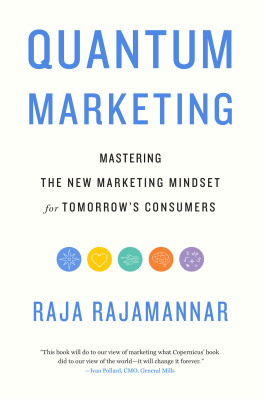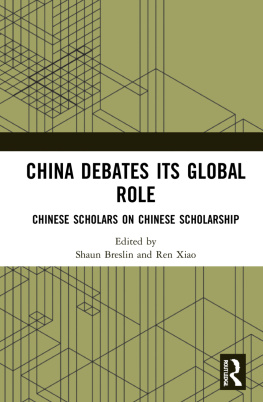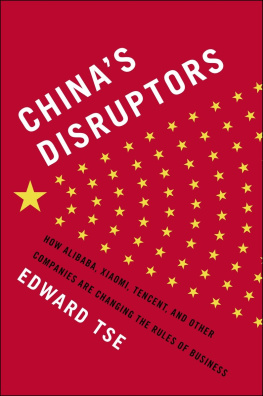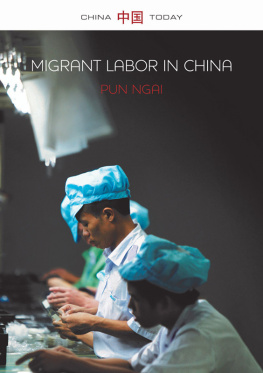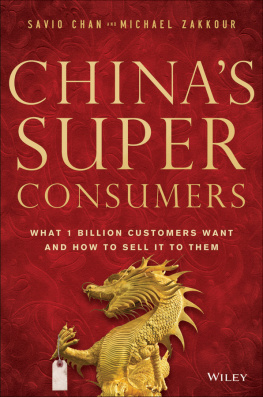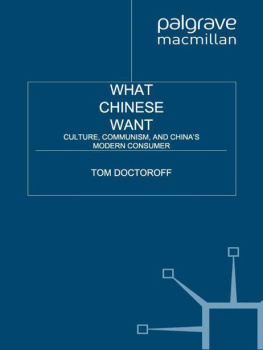

Chinas Evolving Consumers
Edited by Tom Nunlist
ISBN-13: 978-988-8422-92-0
2018 Tom Nunlist and the contributors
Cover design: Jason Wong
BUSINESS & ECONOMICS / Consumer Behavior
EB106
All rights reserved. No part of this book may be reproduced in material form, by any means, whether graphic, electronic, mechanical or other, including photocopying or information storage, in whole or in part. May not be used to prepare other publications without written permission from the publisher except in the case of brief quotations embodied in critical articles or reviews. For information contact info@earnshawbooks.com
Published by Earnshaw Books Ltd. (Hong Kong)
Contributors

Tom Nunlist has been studying China for ten years, and has lived and worked in Shanghai for five years. As a journalist, he wrote and edited feature stories on economics, policy and business in China. He now works as China analyst for an international risk consulting firm.

Ashok Sethi leads the Illuminera Institute in Shanghai, an organization dedicated to skill-building, consultancy and thought leadership in the area of consumer insights and marketing. Ashok has over 30 years of experience in this field and has been studying Chinese consumers for the last 15 years. Ashok has held a number of senior-level positions including Managing Director of TNS China, Regional Director Methodology and Consumer Insights at TNS Asia-Pacific and Managing Director of GfK China-Consumer Experience.

Sacha Cody is an anthropologist and China Studies scholar living in China. A research-based consultant for many years, Sacha has helped businesses, governments, and NGOs understand Chinese society and culture. In 2016, he completed a doctorate in anthropology at the Australian National University, researching food safety, organic farming and the politics of urbanization and rural development in China. He is currently undertaking ethnographic research into international Chinese businesses.

Zoe Hatten is a doctoral candidate in anthropology at the Australian National University. While based in Shanghai from 2015 to 2017, she conducted ethnographic research exploring the commercialization of marriage in post-Mao China.
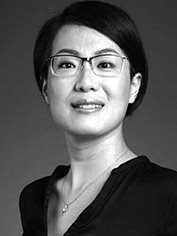
Annie Fang is the founder of boutique consultancy firm Nine Dots Solutions, which focuses on helping startups building businesses from zero to one. She also contributes five hours of work per week as a therapist, helping veterans from the Peoples Liberation Army Special Operations Forces adapt to society.

Elisabeth de Gramont has spent the last 12 years traveling across China helping some of the worlds biggest brands better understand their consumers. She is the Managing Director of C Space Jigsaw, a leading consumer insight and collaboration agency.

Sizhang Kong is Partner, Research Director and Co-founder of Metis International. She heads Metis Family Research, which focuses on issues surrounding the transformation of womens roles inside the family.

Francesca Hansstein , Ph.D., is an applied statistician currently working at the School of Public Economics and Administration, Shanghai University of Finance and Economics. Her research interests include consumer behavior, analysis and modeling. She also works as a freelancer on China-based market research projects.

Francis Bassolino has been aging in Shanghai for the past thirty years. He runs Alaris, an investment advisory and management consulting firm.

Forrest Cranmer is a consultant working for Alaris Consulting. He has a background in economics and Chinese studies, and is a fluent speaker of Mandarin.
Acknowledgement
This book would not have been possible without Frank Tsai, who Graham Earnshaw, founder of Earnshaw Books, likes to call The Great Connector of Shanghai. Through the vibrant community of intellectuals and professionals Frank has built with his long-running, sometimes raucous, and always stimulating lecture series, we were able to find a group of contributors even more talented than they are diverse. Franks numerous lecture series, including China Crossroads and Hopkins China Forum , his writings and more can be found at www.shanghai-review.org .
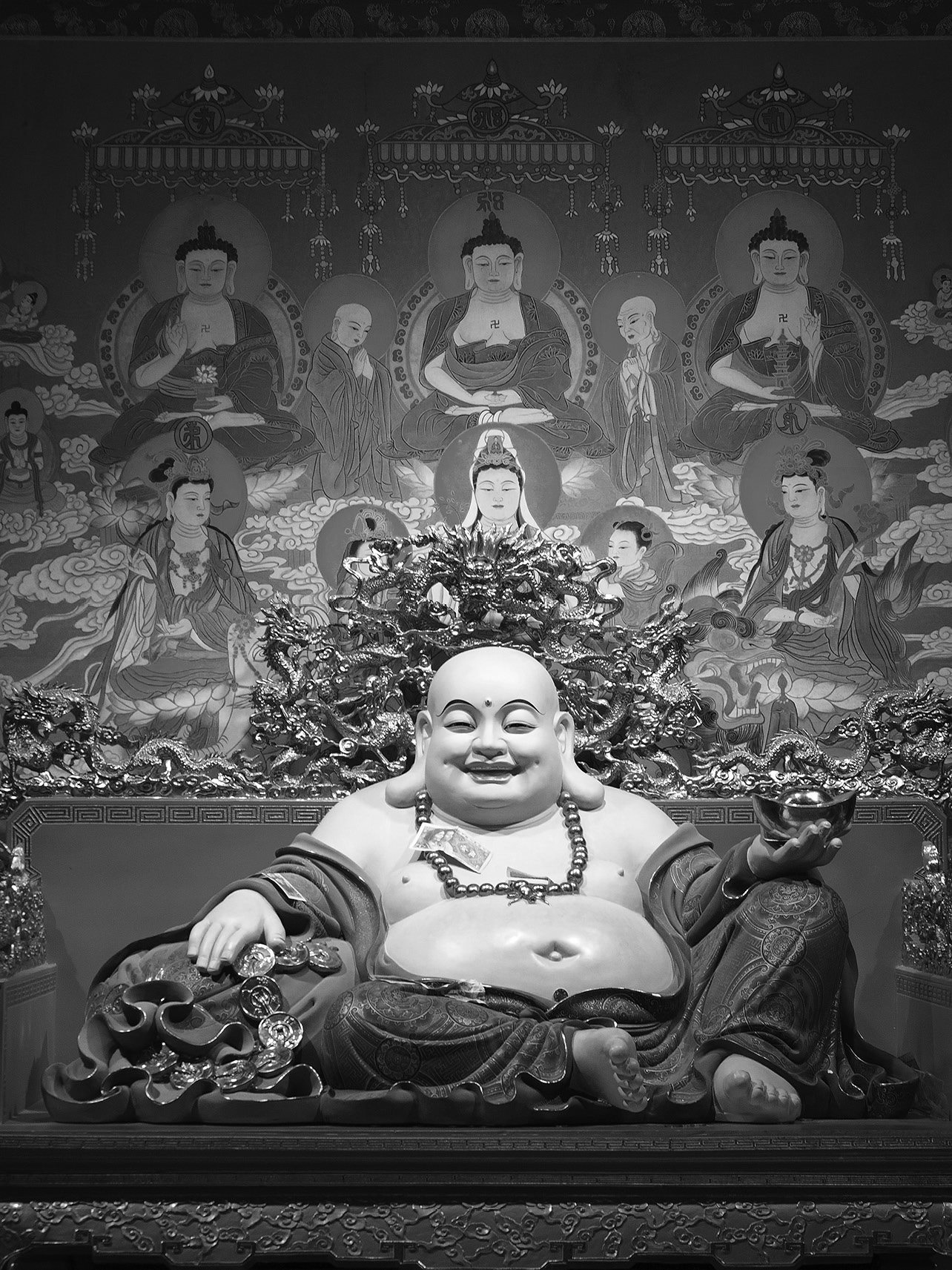
Chapter one
The Wealthy and Evolving
Tuhao
Sacha Cody
Who are tuhao ? What is tuhao ? Whenever I asked these and similar questions to colleagues, friends and interviewees in China, a wry smile inevitably appeared on their faces. Oh, tuhao, they would say, let me tell you about tuhao ! And off they would go But no one would admit they were tuhao , nor even that any of their friends were tuhao .
When I asked my colleague Caroline Law, Director of Qualitative Research at Firefly, a global research firm, to outline a typical tuhao , without hesitation she sketched the image of a Chinese man in his mid-to late-40sperhaps baldingwearing a Burberry polo shirt, Hermes belt, Gucci leather shoes, a Rolex watch on his arm, gold chain around his neck, and a bright national-flag-red packet of Zhonghua cigarettespersonal favorite of Mao Zedong, costing RMB 100 per box as opposed to the more typical RMB 10packed neatly into a leather man-bag tucked snuggly beneath his upper arm.
Tuhao are rich, but they have no taste, Law explained. Whether for a meal, a set of clothes or an apartment, or even a car, they pay for everything in cash.
In fact, amongst most of the people I spoke withwho, like Law, live in Chinas coastal cities and were born in the 1970s and later tuhao are an altogether unique breed of individual. They are older, hail from provincial capitals inland and, as this description shows, there is something both shady and yet comical about them.


